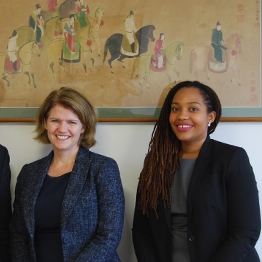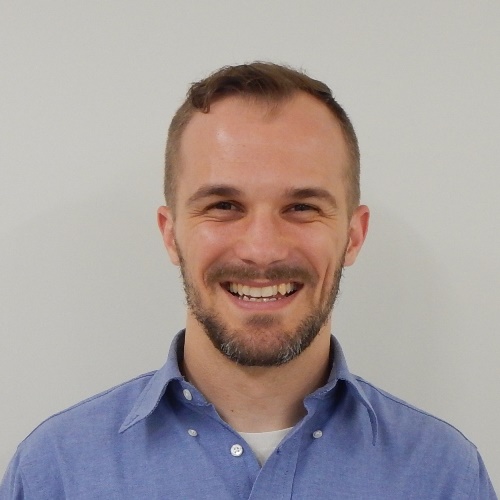KU-GLOCS is the general term referring to various globalization initiatives by Kanazawa University,
including its participation in the Top Global University Project (Super Global Universities).
KU-GLOCS
KU-GLOCS is the general term referring to various globalization initiatives by Kanazawa University,
including its participation in the Top Global University Project (Super Global Universities).
YOU & KU-SGU
"!" and KU-SGU
As Kanazawa University responds to globalization, it introduces a wide range of surprises (!),
unrestricted by existing boundaries.


Tufts University
Office of Student Affairs
Mary Patricia MCMAHON and Nandi BYNOE
Ms. Mary Patricia McMahon, Dean of Student Affairs, and Ms. Nandi Bynoe, a member of the Office of Student Affairs from Tufts University stayed at Kanazawa University for about a week in June.
-Is this the first time you’ve come to Japan?
Mary (M): No, I came to Japan on a trip in 2003. I went to Osaka, Kyoto, Nara and Hiroshima. But I didn’t go to Kanazawa at that time. So this is the first time I’ve come to Kanazawa.
Nandi (N): I studied abroad in a university in Chiba 8 years ago, when I was a junior at Tufts. I took a semester off and studied there. This is my second time.
-Did you go sightseeing in Kanazawa?
M: On Saturday, we went to Kenrokuen Garden, Kanazawa Castle Park, Nishi Chaya District, Higashi Chaya, and Omi-cho Fish Market. We wanted to see all the major tourist sight in Kanazawa, and managed to do it. In the evening, we went to Kanazawa Hyakumangoku Festival, and saw KU students dancing in Odori-nagashi. It was so nice!
N: We went for sightseeing by ourselves. Most people in restaurants, shops, and all the tourist sights are very good at English. Also, maps and signs on the road were very helpful when we got lost, because most of them were written in English as well as Japanese. Even if people don’t speak English, they would try to understand my terrible Japanese. Everybody has been so welcome.
-Kanazawa city is so globalized! Since the Hokuriku Shinkansen opened in March 2015, there have been more and more people coming to Kanazawa from Japan and abroad.
M: We took Shinkansen to Tokyo on Sunday. We both have friends living in Tokyo, so we met the, and we came back on Sunday. It was amazing to do a one-day trip to Tokyo. Shinkansen was fast and comfortable.
N: It was nice to be back to Tokyo where I used to go. My friend took me to Omotesando. Though a couple of things are changed, still I could find a way around.
– What is your impression about our campus?
N: This is a lovely campus. It’s similar to Tufts because Tufts is also on a hill. We have to go up and down on campus. But it’s bigger than Tufts, so we need a lot more walking here. It’s a good way to exercise.
M: We went to “Sakigake,” a dormitory for international and Japanese students, and we really like the feeling of the dorm. Also, we both like the tunnels on the passage ways linking each area.
N: Yes, it’s great! You can go around the campus without umbrella on rainy days. Tufts doesn’t have anything like that. Also, there is a community feeling throughout the different areas.
– You visited the Kanazawa University Super Global ELP Center and watched a class for students by Prof. Jamie Rosenberg from Tufts University.
M: Jamie’s class was very impressive.
N: Students were so engaged. Jamie is even and supportive, but also likes fun. He got students engaged by joking. He’s a talented teacher. Today, we went to Kanazawa University Senior High School, Junior High School, and Elementary School.
M: They were very surprised to see us. But they got a good chance to practice their English. They were very cute.
N: They really liked my hair.
-I heard that a lot of students are involved in volunteers in and outside the university. Where do their motivations come from?
M: We have a lot of student volunteers for different activities such as Civic Engagement and lots of events. They usually are motivated to think about ways to extend their learning and their experiences beyond classrooms. Also, they want to do something meaningful, and to be outside of their own world in the classes and library. Members of fraternities and sororities do significant amount of volunteers as part of their commitments to the group. They are usually very good at doing that.
N: In terms of incentive, it can be helpful to say this volunteering can go on to resume saying you’ve learned these following skills, especially for students looking for some kind of work experience to build resume. Do volunteer work, and there will be a payoff later.
-That might be true in our university, too. Do you have a lot of opportunities to talk with students?
M: We talk with students all day long. That’s our role. We work with different student representatives. They come with ideas, and we talk about the university’s policies, students’ government and so on. Also, we often attend students’ events, concerts and plays.
N: We work closely with students and help shape the campus with them. That’s why we like our job.
-We would like to expand opportunities to work with our students to promote the Top Global University Project. Thank you very much for talking with me today!
(Interviewed in May 2016)
Look more other posts in this category
-
Tufts University
International Student and Scholar Advisor, Internatiolnal Center
Whitney SULLIVAN -
Faculty of Foreign Language Studies, Institute of Liberal Arts and Science
Associate Professor
Mark HAMMOND -
Tufts University
International Student and Scholar Advisor, Internatiolnal Center
Patrick HIMES -
Kanazawa University Super Global ELP Center
Assistant Professor
James ROSENBERG -
*Taking the program at the Kanazawa University Super Global ELP Center*
Professor, Faculty of Electrical and Computer Engineering, Institute of Science and Engineering
AKITA Junichi




